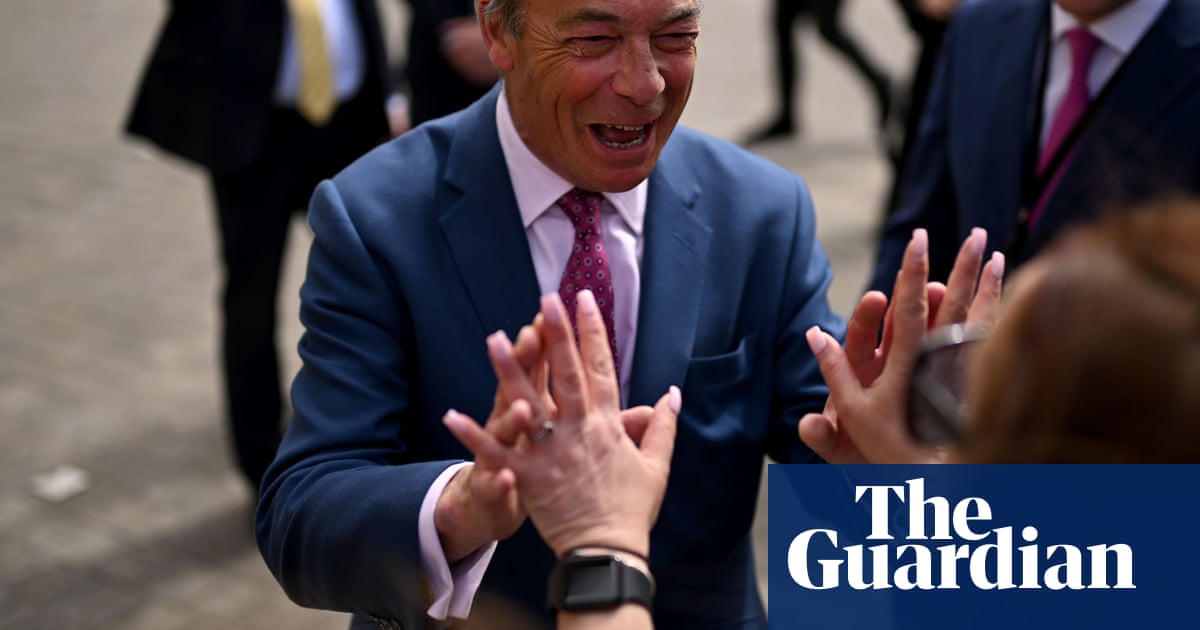Up to 12 newly electedReform UKcouncillors are facing allegations of sharing social media content ranging from support for the far right to explicitly Islamophobic comments.
They include councillors at three different county councils who have shared social media content from Britain First, a far-right party known for staging provocative marches and stunts.
A week after Reform’slocal elections breakthrough, in which it won 677 of more than 1,600 seats contested, the backgrounds of its winning councillors are under scrutiny after the party largely sought to deflect allegations during the campaign.
The councillors accused of retweeting Britain First content include Paul Harrison, who was elected to Leicestershire county council. He retweeted and said “yes” to a question posed on X by Britain First’s chair who asked if followers supported mass deportations and posted an AI-generated picture of Muslim men with Pakistani flags.
Russell Cherry, elected as a councillor in Thurrock, allegedly retweetedPaul Golding, who is Britain First’s leader and has a conviction for religiously aggravated harassment. Ivan Dabbs, a Reform councillor in West Northamptonshire, also allegedly shared a Britain First tweet and material by Golding calling for a street demonstration.
The off-the-shelf vetting software used by Reform UK before the elections was from Ferretly, a US social media startup founded in 2019, the Guardian has learned. The platform assesses digital red flags, including hate speech, disparaging or bullying behaviour and inflammatory rhetoric, along with connections to extremist groups or individuals.
However, Reform has drawn criticism for its reliance on the platform after its leadership claimed to have the “most in-depth vetting procedure” of any party. In an interview with Times Radio on 30 April,Nigel Faragesaid vetting was done internally using “AI techniques and other things” to “give us a bit of a shortcut”.
Neither the Conservatives nor Labour rely on AI software to the same degree. In the case of the Tories, a 30-strong group was involved in vetting each of its general election candidates.
By Thursday, Reform was known to have lost at least three of its elected councillors. They included Donna Edmunds, a councillor in Shropshire who was suspended on Wednesday after she said that she planned to defect from the party.
Edmunds, a supporter ofRupert Lowewho was kicked out of Reform and has been engaged in a bitter row with Farage, accused the Reform leader of treating members with contempt and described the party as a cult.
Luke Shingler, who was elected in Warwickshire, said he would be an independent councillor for the “next 18 months” because his work meant he was unable to serve under a political organisation. Shingler is understood to work for the RAF. A third councillor, Desmond Clarke, has resigned from Nottinghamshire county council, triggering a byelection.
Many of the alleged social media posts by Reform councillors were unearthed by the counter-extremism campaign group Hope Not Hate.
Georgie Laming, Hope Not Hate’s director of campaigns, said: “Nigel Farage has claimed that Reform UK have the ‘most in-depth vetting procedure’ of any party. Our investigation shows that their processes leave much to be desired.
“Not only have they admitted using ‘AI techniques and other things’ to do the vetting, but Reform UK continue to shirk responsibility for their candidates’ online behaviour. They have yet to drop any of the candidates that have been exposed,” she said.
Hope Not Hate uncovered Reform candidates – some now elected – who posted anti-Muslim hate, pushed far-right conspiracies including calling the climate crisis a “globalist hysterical climate hoax”, praising extremists such as Tommy Robinson and sharing content from David Irving, the UK’s best known Holocaust denier.
Reform has been approached for comment.
